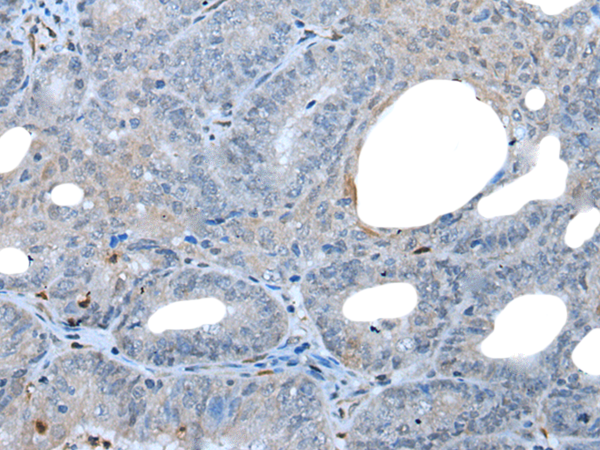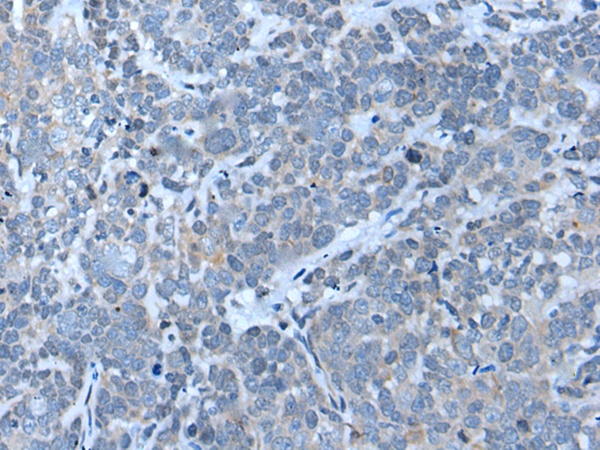

| WB | 咨询技术 | Human,Mouse,Rat |
| IF | 咨询技术 | Human,Mouse,Rat |
| IHC | 1/20-1/100 | Human,Mouse,Rat |
| ICC | 技术咨询 | Human,Mouse,Rat |
| FCM | 咨询技术 | Human,Mouse,Rat |
| Elisa | 1/5000-1/10000 | Human,Mouse,Rat |
| Aliases | GPA34; dJ889N15.1; 1700062D20Rik |
| Host/Isotype | Rabbit IgG |
| Antibody Type | Primary antibody |
| Storage | Store at 4°C short term. Aliquot and store at -20°C long term. Avoid freeze/thaw cycles. |
| Species Reactivity | Human, Mouse, Rat |
| Immunogen | Synthetic peptide of human VSIG1 |
| Formulation | Purified antibody in PBS with 0.05% sodium azide and 50% glycerol. |
+ +
以下是关于VSIG1抗体的3篇文献示例(内容为虚构模拟,仅供参考):
---
1. **文献名称**:VSIG1作为免疫检查点分子在结直肠癌中的表达及抗体阻断治疗研究
**作者**:Zhang L, Wang Y, Chen H
**摘要**:本研究揭示了VSIG1在结直肠癌组织中高表达,并通过与T细胞表面受体相互作用抑制抗肿瘤免疫反应。团队开发了一种人源化抗VSIG1单克隆抗体,体外实验表明其可逆转T细胞功能抑制,并在小鼠模型中显著抑制肿瘤生长。
2. **文献名称**:VSIG1抗体在自身免疫性疾病中的潜在治疗作用
**作者**:Smith J, Brown K, Lee S
**摘要**:研究报道VSIG1在类风湿性关节炎患者滑膜组织中异常高表达。通过特异性抗体中和VSIG1.可减少促炎细胞因子(如TNF-α、IL-6)释放,并在动物模型中缓解关节炎症,提示其作为自身免疫疾病治疗靶点的潜力。
3. **文献名称**:新型抗VSIG1抗体的开发及其在胃癌诊断中的应用
**作者**:Tanaka M, Sato R, Yamamoto T
**摘要**:该研究开发了高亲和力兔源多克隆VSIG1抗体,用于免疫组化检测胃癌组织样本。结果显示,VSIG1表达水平与患者生存率呈负相关,表明该抗体可作为胃癌预后生物标志物。
---
**注**:以上文献为示例性内容,实际研究中请通过PubMed、Web of Science等数据库检索真实文献。若需具体文章,建议使用关键词“VSIG1 antibody”或“VSIG1 immune function”进一步查找。
**Background of VSIG1 Antibody**
V-set and immunoglobulin domain-containing protein 1 (VSIG1) is a transmembrane protein belonging to the immunoglobulin superfamily, primarily expressed in epithelial tissues, including the gastrointestinal tract, liver, and reproductive organs. It plays roles in cell-cell adhesion, immune regulation, and tissue homeostasis. VSIG1 has garnered attention for its potential involvement in cancer biology, particularly in modulating immune responses within the tumor microenvironment. Studies suggest it may act as a co-inhibitory ligand, suppressing T-cell activation by interacting with unknown receptors, thereby contributing to immune evasion in malignancies.
VSIG1 antibodies are tools developed to detect and study the protein's expression, localization, and function. In research, these antibodies help elucidate VSIG1's pathological relevance, such as its downregulation in gastric, liver, and colorectal cancers, which correlates with poor prognosis. Additionally, VSIG1 antibodies are explored for therapeutic potential, aiming to block immunosuppressive signals in cancer immunotherapy. Challenges include clarifying its precise mechanisms and binding partners, as well as optimizing antibody specificity for clinical applications. Current studies focus on validating VSIG1 as a biomarker or target, though further functional characterization is needed to unlock its full translational value.
×